Preface
I have lived in Berlin for my studies for three years. But as most children from time to time I visit my parents which live in Cologne (Köln in German). Today I woke up on the couch in Cologne and not in my former room. My Ecuadorian cousin is currently occupying the bed. She studies in Germany since one year. In the kitchen I greeted my mother in German “guten Tag” and my father in Spanish “buenos dias”. Later that day I went out with Malik, a Turkish friend of mine, and we make one or two jokes about Almans, a humorous word for “bio-Germans”. In the evening the whole family was invited to have dinner at my aunts place. She cooked locro de papa, an Ecuadorian potato soup and the languages are all over the places, I hear Spanish, German and even some English when my sister and cousin talk with each other. After dinner I went to a latin party with my German-Ecuadorian cousins just around the corner. On the way home and before I went to sleep I had a short video chat with my family in Ecuador.
Many things that happened that day, bilingualism, cultural identity, cuisine, family and communication, only happened in the way they did because my father started a process forty years ago. In 1980 he decided to study in Germany, he migrated from Ecuador to Germany and with that decision started a process of migration.
The main argument this paper tries demonstrate is that “Experiences of migration are deeply linked to family”. Migration is a very personal process involving family but in discourse this is mainly forgotten. Their stories are important because stories like these are not told often in Germany. Often media represents migration and immigrants in negative ways. Most articles or broadcasts are covering migration as cultural menace, separation/disintegration and not integration or in connection to crime. Also in the majority it is talked about immigrants, they are not given space for their own voices (which is by no means monolithic). I try to take a different approach, here migration is not looked upon from a macro level but from a micro level where each individual tells his or her story of migration. Relying on interviews with them as source is directly giving a voice to people, who do not get a lot of media coverage.
Migration from their perspectives is their personal experience, an integral part of their life, hearing their voices gives us new angles to think migration. We move away from a macro level that usually analyzes migration in relation to the benefits or downsides for Germany and go to see what crossing borders means for an individual. And these personal experiences are deeply linked to family.
Migration is not a singular fact, but a complex ongoing process. Often processes like migration, but also others like marriage, are not thought as developing but instead as a bureaucratic act. Marriage is seen as the moment when the institutionalized bound is created, migration is seen as the moment a person moves to another country or has the permission in form of a visa. Often it is forgotten what happens before and after these moments. I decided to separate this work into two sections, each showcases a segment of migration. The first section “Coming” deals with the border crossing from Ecuador to German with the guiding question “Can migration be facilitated by having family in the country of arrival?”. The second “Cultural Identity” will explore cultural identity with the “Why do cultural identities differ even when growing up under similar circumstances?”. I will rather focus on the personal experiences of migration instead of seeing migration, as a administration act or wider social phenomenon. The individual stories of migration will be the core of this work. So this study focuses on the micro level. Combined we will see that these two section are both part of migration, touching very different topics but with the common factor of family.
In “Coming” you will read about my father Fernando Antonio Uscátegui, my aunt Maria Sol Uscátegui de Graf and my cousins Carlos Samuel Armas and Erika Uscátegui. All of them migrated in different periods of time. Some came unexpectedly, some for family and some for opportunities. You’ll learn about their motivations, their first experiences and the connections they created. In “Cultural Identity” is probably a bit more personal. Germany is a state with a lot of immigration, cultural identity is affected by immigration. Nowadays there are many people who identify as Germans but not as “German-German”, so I do myself. If you ask me I’ll tell you that I’m “German-Ecuadorian” We use different terms to show and create our identity, challenging and widening the hegemonic concept of what it means to be “German”. Through my sister Nina Luise Uscátegui and my two cousins Tim Sebastian Graf and Maria Sophie Graf. I like to explore cultural identity and show how each developed a distinct identity.
Each individual migrating sets in motion a course of migration, but none of theme is equal to the other each one is unique, nevertheless we can find similarities between them. So when you ask my friend Malik you might hear about a quite distinct story of migration than I’ll tell you, but family will be a theme.
I hope you enjoy your time reading.
Coming
Migration is a process, that has big impact on the country which the migrant is from, on the country of arrival and possibly then the country of return again. The process starts before setting a foot into a plane and continues after the plane is landed. Sometimes the process includes a long, possibly even a dangerous journey, on foot, boats and trucks. My four family members all had the privilege to fly, to travel with comfort. If we look at the migration as a process, we can not necessarily figure out where the start or the end is, nevertheless every story needs a beginning. The moment of leaving Ecuador and coming to Germany seems to be a good starting point to begin to tell the story of my family.
As said, migration is not a singular fact but a complex process. Nevertheless a guiding question will lead us throughout this part: “Can migration be facilitated by having family in the country of arrival?”
Why Germany?
Why did Fernando Antonio Uscátegui, Maria Sol Uscátegui de Graf, Carlos Samuel Armas and Erika Gabriela Uscátegui left Ecuador and came to Germany? Peru, Argentine and Colombia are Countries closer to Ecuador. The United States of America had more established links with Ecuador and maybe Spain could be considered as a more relevant destination, because of the language. So why Germany?
1980. My father Fernando Antonio Uscátegui was a young 20 year old man, living in Ecuador/Quito, raised in a well-situated white mestizo family. Going to Germany hasn’t crossed his mind until his uncle told him that there was the possibility to obtain a scholarship to study in Germany. To receive the scholarship, granted by the Karl-Duisberg-Stiftung, he had to pass an exam. Antonio did not think much about the exam and took it because there was not a single reason not to take it. Unexpectedly one hour after finishing the exam they already told him that he passed all exams, got the scholarship and that his studies in Germany would begin in two months.(IA) Antonio was shocked, he just went to take the exams because of the recommendation of one uncle, he has not really considered the outcome. In these days, he rarely knew people that studied abroad and if so they studied in the United States of America or Argentine. Through this experiences Germany was never a country he had in his horizon of expectancy to go and study there. After the first shock and some days of thought, Antonio said to himself that the chance to study in Germany with a scholarship was the possibility that could be only given once, so he accepted the grant.(IA) He left soon after that. There was an uncertainty when the airplane departed because he did not know how many years he would be separated from his family. Looking back Antonio stated “I was thinking about studying for four or five years here, in Germany and then going back…that was the plan”(IA), a plan that was never put into action. We see that small hint that Antonio’s decision to take a chance was the cause that started the process and all that follows.
1988. Eight years have passed since Maria Sol Uscátegui’s brother Antonio arrived in Germany. As a young woman, 23 years old, she had worked in the gastronomy and currently was working as a secretary.
In contrast to her brother she already had some connection with German culture and language. She was sent to a religious school which was run by nuns, but Sol wanted to be in a mixed school and she followed her wish by going to the Colegio Alemán in fifth grade (German school). In 1988 she wanted to visit her brother. After being in a five years long relationship, she was always fighting with her boyfriend. Antonio remembered his mother told him that his sister Maria Sol was crying all day. To get some distance Maria Sol’s mother advised her to visit her brother Antonio in Germany. In this year Antonio visited Ecuador and recommended his sister to apply for a student visa and helped her with bureaucracy, and inscribed her in a German university. Antonio thought that it would be easier for Sol with a student visa to stay in Germany if she wanted to.(IS) Maybe the information of her brother made her think about the opportunities she could have in Germany. Her initial decision to visit Germany was mainly influenced by the breakup with her boyfriend. So she decided to visit her brother who already has lived in Germany for several years, without too much thoughts of staying. In August 1988 her plane took off to Frankfurt am Main.
2008. One year after Sol left Ecuador, her sister gave birth to her child – Carlos Samuel Armas. He grew up in Quito, and had one uncle and one aunt in Köln/Germany. For him Germany was not necessarily a close but also not so distant country as for his peers. Certainly his mother talked about her siblings living in Germany and they Antonio and Sol visited Ecuador quite frequently. Soon after he had four German-Ecuadorian cousins living in Germany who were welcomed guest in Ecuador and to whom Samuel loved to show around with wonder in their eyes.
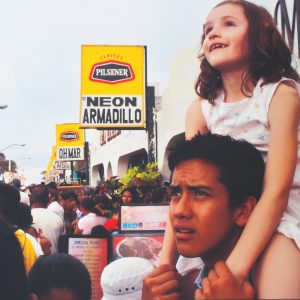
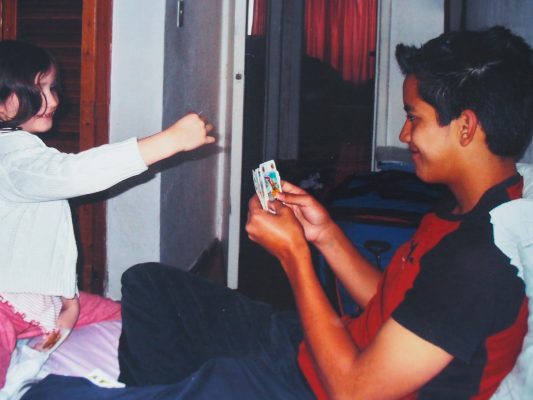
Once he visited Germany in 2000 for two months. When Antonio arrived in Germany he did not even know a friend of a friend that studied in Germany, meanwhile Samuel had two uncles, two aunts and four cousins in Germany. Both his older brothers did an exchange after they graduated from high school. One went to Israel, the other to the United States of America. After high school Samuel also wanted to go to the United States but he did not get a visa. Samuel was unsure how to continue his path, he saw that his mother and his father already financed the studies of his two brother and that to finance a third son in university could be hard. Samuel remembered what Antonio and Sol have told him: “to study here [in Germany] is practically for free and so I decided to come here and make my way from there on.”(ISa) With the help of his family who lived in Germany he got legal documents, that made it easier for him to get the visa. When he came Samuel said: “I had the idea of going back to Ecuador,..to get a job where I can change something..[…] a high position”(ISa), but for a position like that a reputable degree was needed.
28 years after his uncle Fernando Antonio and 20 years after his aunt Maria Sol came to Germany he was going to follow their footsteps and took an airplane in February 2008.
2019. Unlike her aunt Sol, uncle Antonio and cousin Samuel, Erika Uscátegui did not grew up in the house in Quito. She is the “unlawful” daughter of Antonios and Sol’s brother, born in 1991. She lived in Manta and never had much contact with the family of her father nor had she a lot of contact with her mother’s side. Basically she grew up in a single parent household with her mother having rather less than too much money to spend. In a Crisis of 1998 and 2000 her mother lost all her savings and shortly after, her father died in 2002.(IE) To say she was poor probably is exaggerated, but sometimes there was only enough money for “rice and tuna”(IE), given that the tuna was not too expensive. Unlike her family in Quito, Erika lived at the coast, so the fact that she never had much contact with her family was partly because of geographical factors, she said that “Maybe it does not seem much but to go up the mountains, those that take you to the sierra it’s super complicated and it is not a journey you do every day”(IE) After her bachelor degree in “Communication Science” she worked in different enterprises with various ups and downs. In 2016 her workplace was destroyed by a devastating earthquake. Around 2018 she got a decent job in the public sector, working for the state. Even after that, she thought that every day it is getting harder and harder to get a “good” job without a master degree and her situation got worse after a political change. In 2017 the new president, Lenin Moreno, was elected and he started to take measures to liberalize the economy. One measure was to cut spending’s in the public sector and each year they fired 20.000-25.000 employees that only worked on contract like Erika and were not public officials.(IE) The new political developments in her country, forced her to start thinking about studying again. A cousin in Germany showed her a website where she could find different master programs, program of “Media and Communication Science” in the city of Illmenau caught her attention. She was saving money for a year and similar to her cousin Samuel she got help from her family in Germany with legal documents. At the moment Erika is not sure if going back is a good idea for her. She stated that “Ecuador’s economic situation is getting worse every day. Due to the Coronavirus the situation is even worsened. Going back to Ecuador at this moment wouldn’t be the wisest.”(IE) In October 2019 she took her airplane to Germany.
All the family members of the Uscáteguis came from different places and with distinct reasons. The members who share the most similar stories are Samuel and Erika, they decided to go to Germany to study, while Fernando Antonio made his decision because of his uncles advise and the unplanned scholarship. Maria Sol came mostly to escape her lovesickness. When they arrived none of them thought that they would stay permanently in Germany. Only Erika has her concerns about returning to Ecuador because it’s bad economical situation, a situation that already influenced her to study abroad.
Within these four we can call Antonio a pioneer, the one who migrated first and created a “harbor”, a hub where his following relatives could arrive when they migrated. We saw that Antonio helped Maria Sol with the student’s visa, and later Samuel and Erika got help with legal documents from their family in Germany. You will see how this already established family in Germany helped their relatives that just arrived, with bureaucracy, financially and through other means. The first arrival of the pioneer facilitated the arrival of the latter, a theme we will find later on again and again.
In Germany
After arriving in Germany each one encountered with various challenges like the language barrier, a new won independence, communication, as they experienced love and family as a reason to stay in Germany. There are many more themes we could explore here but I do not want to bore you. To find a beginning to tell the experiences was rather simple. For each one the experiences in Germany started when the plane’s wheels touched the ground.
Arriving
In 1980 Antonio came not knowing anyone in Germany, but he had the financial and bureaucratic help of the scholarship. They organized his visa, payed for his flight and covered his cost of living during until he finished studying.(IA) He came to study mechanical engineering, a subject he did not enjoy so he changed his career to photo engineering.(IA) When he first arrived in Frankfurt am Main he was curious to see the signs in the airport, that indicate you exactly where you have to go without even speaking the language. To get your luggage you just have to follow the sign with a suitcase on it. From Frankfurt he went to Saarbrücken. There the Karl-Duisberg-Stiftung helped him and other scholarship holders to open a bank account, to have an initial German course and to orientate in Germany. For example, they told to the new arrivals that it is cheaper to buy groceries in Aldi, a German supermarket-chain. After two weeks in Saarbrücken, Antonio went to Cologne to do a German course for six months, then he moved for nine month to Dortmund to do a Studienkolleg. Many foreign students have to to a Studienkolleg, because the German state says their education is not equal to German education. Foreign students have to “catch up” in order to study in Germany. Once he finished the Studienkolleg he went back to Cologne to study. While he was alone in unknown territory his expenses were covered.(IA) What amazed him in Germany in contrast to Ecuador was the facility to travel. The developed infrastructure of railways, street and therefore mobility is easier in Germany than Ecuador. He remembers that “everything worked like a clockwork, for example the German trains always arrived on the scheduled time within seconds […] a thing you can not say today.”(IA) The infrastructure, the cheap options to travel enabled him to visit various cities in Europe.
Maria Sol’s arrival was quite different than her brother’s, the pioneer, already lived in Germany. When she arrived in August 1988 Antonio still enjoyed his vacation in Ecuador. Her plane landed in Frankfurt am Main where she took the train to Cologne. Luckily at the train station there was someone waiting for her, Stephanie Broch, the back then girlfriend and now wife of Antonio, waited for Sol. Stephanie brought Sol to the flat where she lived with Antonio and where they would live for the next couple of months with Sol. With Antonio already living in Germany, Sol “possessed” social capital, over her brother she got in contact with Stephanie who picked her up at the train station and had access to a living place for the first couple of months.
One of the first things Sol remembers was that things “smelled differently, I smelled something strange something I did not know, a smell of humid summer.”(IS) To pass the time in the first three months she took a German course where she met a Spanish Au-pair. They became friends and Sol often visited her friends Au-pair family, there she met a friend of the family Mimi Graf. Coming from a broken relationship with a tattered heart, she fell in love with Mimi Graf and decided to stay. With the student visa it was quite easy for her to stay in Germany, but before she could study she had to do the Studienkolleg, After that she started to study regional sciences of Latin America. After the couple of months she left the flat of her brother and her future sister in law and moved in with Mimi Graf.(IS)
Samuel arrived in February 2008 in Frankfurt am Main. While Sol had to take the train to Cologne, Samuel had the comfort of his family picking him up from the airport with their car. For the first year he lived in his uncle’s house in Cologne and took a German course to reach the required level of German to do the Studienkolleg. He started working in the Petit Prince, a latin bar. His uncle helped him to find this job, as Antonio knew the owner. Both, Antonio and Sol, were the frequent visitors of the Petit Prince, like many other Latinos who went there to dance. For the Studienkolleg he moved to Darmstadt for a year, after that he moved back to Cologne to study regional science of Latin America. When he came back he rented a small room that his aunt Sol owned, just above her own flat.(ISa) We see that Sol and Antonio had accumulated more capital the years living in Germany, Samuel was picked up with a car and found a job through his uncle, things he had access to because of his social capital. Furthermore they created a network connecting Germany and Ecuador. Samuel had two small hubs in Germany who helped him with his arrival.
At first the changing weather was hard for Samuel he noticed that “I knew Germany had […] things like a very cold winter…something we are not used to in Ecuador or these incredible hot summers…they are astonishingly nice, but the changes are a bit difficult.”(ISa)
When Erika arrived at Frankfurt am Main, in 2019, the first night she stayed in the house of the German grandmother of one of her German-ecuadorian cousins, who lives in Frankfurt. One of the first things that made her gasp was the time that sun set and that in winter the time of daylight is very short.(IE) On the second day of her arrival, her aunt Maria Sol and her uncle Fernando Antonio came with a car to take her from Frankfurt to Cologne. For next few weeks she stayed in Cologne, but unlike her uncle, her aunt and her cousin, she was not going to study in Cologne. Her master program was in Illmenau, in the province of Thuringia. So, one week before her studies started her uncle Antonio and her aunt Stephanie drove her to Illmenau and helped her with various bureaucratic processes. Through her aunt Stephanie Erika had access to her knowledge of German bureaucracy, that all work in German language. This facilitated the process of arriving, inscribing in university, open a bank account or register her living place in town.(IE)
We can examine a clear change in the way each Uscátegui arrived in Germany. While the pioneer Antonio Uscátegui had no friends or family who could support him, but with a considerable financial backing, Sol, Samuel and Erika all were received by family members at arrival. They had at first a place to arrive and stay, got help of their family to find work and to get through the jungle of bureaucracy to get a visa and later in Germany. To describe the change the best we can look at the arrival at the airport. While obviously no one picked up the pioneer, Sol at least was found by Stephanie at the central station and Samuel and Erika even had their personal family “taxi drivers” who came to pick them up from the airport. Furthermore Erika’s case shows us how well established her family and the connection of them is in Germany, as she slept the first night in the house of the German mother in law of Sol.
Interestingly Sol, Samuel and Erika told about their experiences with the new climatic environment in Germany, that brings different scent with it, that unlike in Ecuador the days are longer in summer, shorter in winter and therefore produces the four seasons with the changes in between sometimes causing weather sensitivity as Samuel described.
Independence
Leaving Ecuador behind Antonio, Sol and Samuel also left their family, this meant to abandon the structures they relied on. In Germany they had to “be aware to pay your bills, pay for electricity, to pay everything…that were things I have not done for myself”(ISa), as Samuel puts it. The new won Independence was a challenge for all of them. For Samuel who already had family in Germany and lived with them the challenge did not start immediately, but at the moment he went to Darmstadt for the Studienkolleg. Sol remembers that she always had the support of all her family back in Ecuador and now suddenly she had to be independent.(IS) Samuel and Sol probably missed many things like Antonio, but looking back he reflects that “with time you realize that on the other hand you gain more and more independence and you realize that you can do it”(IA).
Especially for Maria Sol this new gained life of her own was a reason to stay in Germany. While her brother enjoyed the scholarship, she had to work to maintain herself. Her first job was as a house cleaner in a kinder garden. She missed her family and always thought about going back to Ecuador. One day she had: “to clean a bathroom that was indescribably disgusting”(IS) and almost broke down. She could not stand this work anymore and was on the point to call her parents and go back. She paused and thought “when I go back now…I will be a loser all my life because I did not manage to set foot here by myself and I will depend on my parents for the rest of my life.”(IS) The decision to stay in Germany was a decision that showed that she was capable of living on her own.
Another common theme is that none of the three had actually cooked before arriving in Germany, they all had never acquired the skill of cooking. Antonio has rarely boiled or fried an egg back in Ecuador and Sol remembers that she was the youngest of four siblings so her parents pampered her. Sol said that her grandmother did not even let her enter the kitchen.(IS) Their cooking skills were non-existent and had to be learned. When Sol arrived Antonio proudly showed his sister how to boil an egg and how to cook rice.(IS) His newly gained cooking skills were helpful in every day life, but soon he started to realize that in Germany he was far away from his culture and the people who cooked for him all the Ecuadorian dishes that he loved. He started to miss the traditional Ecuadorian food and wrote a letter to his mother, asking for recipes and maybe a little tips to learn how to cook certain dishes.(IA) Suddenly not surrounded by Ecuadorian culture and its representative cuisine, Antonio was required to reproduce his culture by himself. He lacked the knowledge of Ecuadorian cuisine and had no one in Germany who cooked Ecuadorian. Cooking an Ecuadorian dish by himself brings him mentally closer to Ecuador, in some sense he is keeping a connection to Ecuador, as he is cooking and eating, he’s thinking about his birthplace and maybe the recipe that his mother sent him. The new independence forces him to engage with his culture and that he has to keep it alive by himself because there is no one around him who will cook for him an Ecuadorian dish.
Coming to Germany was a big step into their independence and adult life. Taking those steps was not necessarily caused by migration and the life in Germany. Antonio, Sol and Samuel all could have gained their independence in Ecuador as well, but for them the arrival in Germany was intertwined with independence. For Sol it went even further and to be independent was equal to claim her place as a grown woman. Antonio liked this breeze of independence, after his diploma he started to freelance as a cameraman and says that “it fulfills me, not to have a boss or something like that”(IA). In Germany suddenly they had far less connections, they did not knew many people in Germany, did not were fluent in German or knew the bureaucracy here in Germany.
The exception is Erika, who did not grew up with a big family surrounding her and spoiling her. She already worked in Ecuador and payed for all her bills. While the others came in their early twenties, she came in her late twenties. In the course of the Covid-19 pandemic she would be isolated in Illmenau, as all lectures in her university would be hold online. Though she lived independently during the crisis she could rely on her family in Cologne. She lives there since March.
Staying
Antonio and Sol established their life in Germany, they work, have friends and founded a family here. Either of them initially had the idea of going back to Ecuador but in the end they stayed. But for none of them it was a single decision to stay. It just happened that they lived in Germany as young adults and created their world here.
When Antonio finished his studies, he had moved into a flat with Stephanie, she still was studying, so Antonio started to work. When she was finished, he already had a routine here in Germany. Stephanie did not think about engagement because she felt that she did not need an official confirmation in form of a marriage for her relationship.(ISt) But in 1991 Antonio’s visa was expired and German State would expel him, the only way he could acquire a permanent residency was marriage and so my father and mother got married.(IA Sol had married her now ex-husband in 1992 and gradually knew she would stay. Still Antonio and Sol always had the idea of returning to Ecuador somewhere in their minds and talked about this idea with their partners.(IA) While for Maria Sol and Antonio this idea seemingly could be an actual plan, for Mimi and Stephanie it was more like a nice dream, and never a serious consideration.(ISt, IM)
The moment Sol gave birth to her first born Tim Sebastian Graf in 1994, she knew that she was going to stay. She thought “now even if I wanted, I could not go [back]”(IS) and soon after, in 1996, she gave birth to her daughter Maria Sophie Graf. With her family established in Cologne, there were no more serious thoughts of going back to Ecuador. Antonio and Stephanie had her first-born son Lukas Fernando Uscátegui in 1997 and then daughter Nina Luise Uscátegui, in 2000. Unlike Sol, Antonio did not take the birth of his children as a definite reason to stay, but after hearing what his mother said to him finally made up his mind. In 2000 his mother visited him in Germany, this was after the banking crisis, which resulted Erika’s mother losing all her savings. Between 1998 and 2000 Ecuador was in a tremendous financial crisis. Inflation was extremely high and the government under former president temporarily froze money withdraw from bank accounts and later limited the amount of money a person could withdraw. The former currency Sucre was abandoned the 9. January 2000 and the US-Dollar was introduced as official currency. The change devalued the Sucre at a rate of 91%, the government set an official exchange rate of 1 Dollar to 25.000 Sucre. Many people lost all their saving ended living precarious or worsened the already hard stand in society. The situation in Ecuador was so desperate that within these two years up to two and a half million people (around 20 % of the population) emigrated to other countries, mainly the United States of America, Spain and Italy. The new diasporas were from then on a important asset for Ecuador. While in 1993 the diaspora transferred 200 million Dollar to Ecuador, in 2003 the amount rose to 1539 Million Dollar. Financial support send back to Ecuador by the Ecuadorian diaspora became the second largest source of money in Ecuador, right after petroleum. The dollarization led to civil unrest and forced the president had to flee to the United States of America.
Having experienced that crisis Antonios mother told him, that the crisis hit Ecuador hard and many people were leaving the country. “You know what my son don’t come back”(IA) she said to him, and Antonio realized that “when even your own mother tells you not to go back”(IA) the situation in Ecuador had to be really bad. A crisis that led millions to emigrate from Ecuador, also influenced my father’s decision not to go back.
Like his uncle and aunt, Samuel also can imagine living in Germany, he likes his life here. He has a big part of his family here. For now, Samuel lives in Germany with his girlfriend. They’ve known each other since 2012 and are in a relationship since. They are still both young and has already lived one year in Ecuador, so they can imagine living in Ecuador.(ISa) So they still haven’t made up their minds.
I named this part “Staying”, in this case the name easily could be ,,leaving” because to return ,,home’’ to Ecuador, would mean to leave ,,the home” that they have built by themselves, here in Germany. It was not just a single decision, it just happened. They all belong here now. Nor Antonio, Sol or Samuel feel that they are strangers anymore.(ISa) Antonio points out that he was 20 years old, when he came to Germany and now he is 60 years old, he spent more time in Germany than in Ecuador. Still all three of them responded that they feel as Ecuadorians and not as Germans.
But if you ask him where his home is, he would respond “my home is here in Germany”(IA). After coming back to Cologne, from a trip or a voyage and see the Cathedral of Cologne “Kölner Dome”, all three of them say that they feel happy and have an emotion of coming home.(IA, IS)
Dealing with distance
A mean to deal with the distance between Ecuador and Germany are pictures. One example is that the mother of Samuel cut together one photograph of Samuel playing piano in Germany (on the left side) and his brother Cristian playing piano in Ecuador (on the right side). Currently it is her profile picture in Whatsapp.
Two other example of pictures is the montage of a person that passed away. In 1993 the father of Sol and Antonio passed away, when they were in Germany. The family did not have a final photograph with all members together. When Sol and Antonio came to Ecuador for the funeral they took a family picture and edited their father into the image.
Almost twenty years later a similar picture was created. Shortly after Samuel migrated to Germany his brother past away. In this case Samuel was the missing one on a photograph and he was edited into a family picture.
Who can come?
Other important aspects of “Coming” are the legal ways that the German state institutionalized for migration. I want to focus on one aspect, that highlights that migration to Germany is made easier for richer people and therefore reproduces inequality. To apply for a student visa, the applicant has to have around 10.000 Euro on a blocked bank account per year. The German state requires this money to ensure that foreign students are capable to provide for themselves.
The minimum wage in Ecuador is 400 Dollar per month (335 Euro, 31.08.2020), and still 23 % of the nation population are living in poverty (defined by Ecuadorian government) with an income lower than 84 Dollar per month (with big differences between urban ares with 14 % and rural areas with 41 %) and 8,5 % are living in extreme poverty with an income lower then 47 Dollars per month (urban areas with 4 % and rural areas with 18 %).1
Only to save 10.000 would take three years of working for minimum wage while not spending anything, and 30 % of the population are not even close to earn 400 Dollar a month. The most vulnerable to this poverty in Ecuador (and systemic discrimination in general) are Indigenous and Black People, especially women living in the peripheries. With the requisite of a frozen bank account with 10.000 Euro, Germany has implemented a requirement that makes it almost impossible for members of lower classes to obtain a student’s visa.
Samuel and Erika both had the help of their family in Germany, where Antonio for Samuel and Mimi for Erika made an official financial pledge for their nephews. This pledge made the uncles financially responsible and Samuel and Erika did not need the frozen bank account. Furthermore, Erika’s case illustrates that it is more difficult for the people from periphery to apply for a Visa. She did not live in Quito, but at the coast in Manta. In order to get all the documents and certificates for the visa application she had to travel around various cities, sometimes taking the journey to Quito that takes eight hours. All these small trips and certificates accumulated in a cost of around 1000 Dollar.(IE) So besides the official cost of a visa application there are more invisible costs that increase with the distance to a urban center.
Without the help of their family in Germany maybe Samuel and Erika could not migrate or obtaining the visa would be a lot harder.
Conclusion
We could see how the initial migration of the pioneer Antonio set a process in motion, that still has effect on our world. With family bounds created over borders, each migration was easier because the newly arrived person already had a family in Germany. Family was the essential connection to all things in Germany.
The migration of everyone, who arrived after Antonio, was facilitated through a family network, a network that weaved across the globe between Germany and Ecuador. Each described step was made easier, at arrival there is a place to arrive, acquiring a visa is easier, the burden of independence is smaller, means of communication are important to stay in touch with Ecuador but there also is an Ecuadorian family in Germany so one is not alone. The only exception might be language because it is harder to learn a new language like German when all the people you know in Germany speak Spanish. With the financial requirements for a student’s visa, the only reason all the migrations were possible was Antonio’s luck to find about a scholarship and also to receive it. So, in the End Antonio could facilitate his relatives’ migration because his migration had the benefit of the financial backing of a scholarship facilitated. Without sufficient financial backing or the aid of family migration to Germany is hard. So we can affirm the guiding question “Can migration be facilitated by having family in the country of arrival?”, but we to see as well the necessity of some sort of capital to make migration possible.
Within this part we focused on members of the family who grew up in Ecuador and crossed borders to then live in Germany. All of them connected the story of their “coming” to the family they have, in Germany and in Ecuador. The experiences of their migration is linked to family.
In the following section “Cultural Identity” the focus will shift from them to the “next” generation. How did and does the migration experience influenced the children of Sol and Antonio? How is the cultural identity influenced by family? This means we trace the cultural identities of Tim and Sophie Graf and Nina Uscátegui, all three have one Ecuadorian and one German parent.
Cultural Identity
Here, in Germany, people go crazy when the FIFA World-Cup starts. Especially after the World-Cup was held in Germany, in 2006. All of us would watch the Matches together and cheer for the German football team, of course I was rooting for “die Mannschaft”, as we call it ,,our team”. It was quite easy for me to support “die Mannschaft” until a certain Match. The German team was playing against the Ecuadorian Team and I just did not know how to feel. Do I continue to cheer for Germany like the past games? and if so, do I “betray” the Ecuadorian side in me and my Ecuadorian father? Does rooting for Ecuador mean to neglect my “germanness” and German Mother? When I think back probably that was the first moment I remember thinking and negotiating my cultural identity.
As we can see through this example the process of migration is ongoing in the second generation and one aspect of it is cultural identity. Germany today is an immigration country and for that reason many young people, like myself, are questioning and developing their cultural identity. The thoughts often arise because one has one or two parents who do not identify as German.
The Youtube channel “Germania” for example
“draws a actual portrait of Germany and asks: What is German identity? People, who live in Germany, talk about their feelings about identification, their root, places and regions that influenced them and their unique perspective of Germany.”
In videos between five to ten minutes a person (mostly with some kind of migration experience or/and a BPoC) tell how they grew up in Germany, how the developed their identities, often these stories included stories of racism. All together these videos illustrate intriguing perspectives to the question “What it means to be German?” and depicts that cultural identity is an important theme in the life of many people here in Germany.
These identities are in between the local and global. Having connections to the local environment where one lives, as keeping cultural ties to a country sometimes on the other side of the globe.
Through the stories of my sister Nina Luise Uscátegui and my cousins Tim Sebastian Graf and Maria Sophie Graf I like to outline ideas about cultural Identity. All three of one parent that is Ecuadorian (Antonio for Nina, Sol for Tim and Sophie) and one that is German (Stephanie for Nina, Mimi for Tim and Sophie). It is necessary to say the ways in which Nina, Tim and Sophie develop their cultural identities is in no way and can not even be representative for people who grow up within two cultures. There is no clear cut formula that parent 1. with culture A + parent 2. with culture B will have children with a cultural identity of AB.
When asked how do they identify all three gave different answers. Nina said that she is German “but in a conversation it definitely would come up that I have Latinamerican roots”(IN), Sophie responded that she is German and Ecuadorian “but [she] would say that in her case [she feels] a bit more as German”(ISo) and Tim without elaborating said that he is German-Ecuadorian.(IT) For them Germany is the local sphere where they grew up, while their parents connect them to Ecuador thus creating a global bound between two countries. Connecting family over oceans.
The guiding question in this part is: “Why do these three differ in their identification although they grew up under quite similar circumstances?”
What is Cultural Identity?
It is probably impossible to give a clear cut definition of cultural identity, a concept that is made out oft two words, “culture” and “identity”, that already standing alone are difficult to define. In his essay “What is identity (as we now use the word)?” James D. Fearon states that “Even though everyone knows how to use the word properly in everyday discourse, it proves quite difficult to give a short and adequate summary statement that captures the range of its present meanings.”2
Due to these complexities and my rather recent theoretical dealing with the topic, I only like to give some considerations instead of a completely fleshed out theoretical framework. A rudimentary definition of my understanding still is necessary. Through shared social codes, language, history, traditions (and possibly many more things) groups imagine and constitute themselves and their cultures. A cultural identity is then the identification of one person with a culture.
There are there are three considerations I want to highlight in following examples. First that cultural Identity has no essence, second that cultural Identity defines itself by difference and third that cultural Identity contains narratives always being retold and reshaped.
The essence of Cultural Identiy?
There is nothing inside which makes Nina, Tim or Sophie inherently German or Ecuadorian. They can’t just point to a part of their bodies and say “This part is German and this other part this is the Ecuadorian one”. For example there is nothing essential Ecuadorian in dancing Salsa. For Tim Salsa is a part of his Ecuadorian cultural identity and he feels Ecuadorian when dances. He said that is because “I grew up with the Music. I have listened to it since I was little, because my mother listened to it. […] She called [me and my sister] and showed us to dance.”(IT) In contrast his sister Sophie does not feel any more or less Ecuadorian when she dances Salsa.(ISo) Still she might associate Salsa with Ecuadorian culture while it is not part of her Ecuadorian identity.
There is no “true German” or “true Ecuadorian” core. Seyla Benhabib, professor of political science and philosophy at Yale University, points out that “Cultures are not homogeneous units. They consist of self definitions and symbolizations, which their members […] of produced.”3 So if to dance Salsa is “Ecuadorian” or not is not a value intrinsically connected with the dance. What is Ecuadorian and what not is decided by the members of each culture. Usually a word like German or Ecuadorian raises associations that are ascribed to this culture. In the case of German these could be order, punctuality or without humor. The Jamaican cultural theorist Stuart Hall wrote that “[Until recently, we have incorrectly thought that identity is] a kind of fixed point of thought and being, a ground of action… the logic of something like a `true self.’” but that we now think of identity as “an ambivalent point. Identity is also the relationship of the Other to oneself.”4 There is no fixed point in Tim, Sophie nor in Nina that is “Ecuadorian” or “German” that gets passed down generations. Stuart Hall examines that it is a mistake freeze identities into a “timeless zone of a primal unchanging past”5. So how does cultural identity distinguish itself?
Difference
Sophie did not really think about her identity until recently with 23 or 24 years. She reckons that she started to think about because of her new relationship. Comparing how her boyfriend treats his family and how she treats her family, she saw that she and her boyfriend have different worldviews. In conversations with each other they came to the conclusion that some facets of their attitude to life differ in consequences of their distinct cultures. She needs to point to her boyfriend’s culture in order to say “my Ecuadorian cultural identity is this, it is not like his”, she needed the “other” to say what she is. In order to say what our cultural identity is we are in the same time saying what it is not.
Stuart Hall puts it like this:
“We know what it is to be ‘British’, not only because of certain national characteristics, but also because we can mark its ‘difference’ from its ‘others’ – ‘Britishness’ is not French, not-American, not-German, not-Pakistani, not-Jamaican and so on.”6
The demarcation to a group is the possibility to have the feeling to belong to another group. While mechanism is a necessity to position one self, combined with essentialist beliefs about cultural identity can be dangerous. When to “be German” means “not to be Black”, “not to be a Person of Color”, this sets in motion a racist dynamic that deliberately excludes German people that are Black or Persons of Color.
Once I had a conversation about cultural identity with a friend, she is German-Kurdish. She told me that she struggled her whole life with her identity. When she said “I’m German”, she often heard the response “No, you do not look German”. The center of German society excluded her from being a “true German” because she is a Women of Color and kept her as the “other” at the outskirts. So she hears all the time that she is not “really” German, but at the same time she does not feel entirely Kurdish. After all she was born and grew up her entire life in Germany. She often questioned her cultural identity until she studied one semester abroad. Abroad there was no one telling her that she is not a German Women, no one that excludes her from her Germanness, no one hindering her to claim it. She said to me that for her that was the first time she knew without doubts and could say that she is German.
Her experience is in strong contrast to Nina’s, Sophies and Tim experience, and that is important to not. It was difficult for her to claim the German part of her identity due to racism, in contrast Nina, Sophie and Tim never were excluded from their Germanness because they are white. Their whiteness allowed them to develop their German identities quite easily, none of them have struggled because of their cultural identities.
Narratives
As we examined cultural identities are no fixed point. What is part of a culture is discursive, and there are many contradicting narratives told within one culture. We could see that some exclude BPoC from being “real Germans” while others do not. Mainly these narratives tell us who we are, where we came from, on which routes of history we came to the places we are today. For example Tim Graf explain that he is neat and clean because he is German. With the never ending of history these narratives are retold, reshaped and new stories are born. In the following I like to show two different narratives that tell “what it means to be German”, the one is more “traditional” and dominant, the other fighting for recognition.
A lot of time in history classes in German schools is dedicated to the Third Reich and the Second World War. The narrative, that tells us what it means “to be German”, is not only a mere story how the Nationalsocialist gained influence and then established a dictatorship. It is the special form in what this story is told to German people, those people living during fascism, growing up, suffering, resisting, collaborating, committing crimes were not just some people, they were our grandparents, uncles, aunts, fathers and mothers. My personal connection to the Third Reich (and partly my understanding why I am German) is my grandmother telling me stories from that time. German
history becomes our history because we are connected to it. This remembrance and identification with this period of time is central to self-understanding of German culture, but again in way of difference. Maybe this particular part of German history is remembered in order to point to something different and to say “we are not like this (anymore)!” Nina Uscátegui had similar feelings about the past:
She specifically points out her identification to todays Germany in contrast to Germany between 1933-1945. This is a big part of identifying as German, to have a connection through family to the nationalsocialist history of Germany. An example for the connection between German history and family is a book Nina created with her German grandmother Irmgard Broch, born in 1927. Irmgards elder brother Theo was a soldier of the German Wehrmacht stationed in Russia or Ukraine. We do not know what he exactly did there, but nothing good for sure. Irmgard received a lot of letters from her brother and almost a century later she created a book with her granddaughter containing all postcards. As usual in this time Theo wrote in Sütterlin, a old German font, so Irmgard had to translate the letters to Nina, because she could not read Sütterlin. Through this project Nina created a special connection through her grandmother, to a part of German history that she never personally experienced.
It is taught in school, remembered at memorials, represented in media and referred to in political discourse. At first there is no problem to construct a “germanness” that relies on this part of history, but it can cause complications when this narrative dominates the question what it means to be German. As a country of immigration there are a lot of people who do not have this connection through family to the dark past of Germany. Nevertheless they can identify as German, and their narrative of “germanness” can differ. It can mean to be born here or/and to be raised here. But as we could see in the case of my German-Kurdish friend this narrative is and questioned and doubted. White Germans might challenge those narratives because they see the “other” in people with some sort of migration experience (mainly in BPoC to a lesser degree sometime in white people), and as they defined their “germanness” in difference to this “other”, they keep the “other” excluded from their “germanness”.
Similar to my friend there are many BPoC who do experience exclusion. With the hashtag #vonhier (eng. #fromhere) some express their anger and resentments confronting the question “Where are you really from?” Often the first response like “Berlin” or “Munich” is not accepted as it is assumed that they can not be “real” Germans because they are not-white.
With the hashtag #metwo many expressed racists encounters in Germany, like one user tweeted: “After visiting the family of my former girlfriend. Her mother to her:’ For a foreigner he is incredible polite’”. These are only two small examples how German identity often is thought racist and exclusionary (especially for BPoC), and then the “other” is thought to be usually as rude, so it was a surprise to the mother that a foreigner is polite.
The first narrative construct a German identity with looking back on the fascist past of Germany, the other says that you can be German when you were born, raised or just live here. Stuart Hall uses the word différance (embossed by Jacques Derrida) to point out that through time identity always changes and it lives “with and through – not in spite of – the difference […], that is alive due to the formation of hybrid [identities].”7 He thinks that identities always contain different identities underneath. In his life he saw how different people from African, Caribbean and South Asian communities started to identify together as Black, when they lived in the United Kingdom. Coming from different cultures they still could unify under the new label Black that referred to their common experiences of racism. With this example Hall illustrated what he means with différance and how one identity (Black) includes different identities (Jamaican, Nigerian, Pakistani, and so on). He then adds the notion that the term Black in the 1970s and 1980s of the UK “tended to privilege African Caribbean over South Asian ethnicities, male and masculinist gender positions over female and feminist ones and ‘straight’ over queer sexualities”8 So within one identity there are many included but at the same time one narrative (in Hall example straight men) dominated the other narratives (female, queer, etc.). Halls approach makes it possible to think both narratives existing next to each other within what it means to “be German”, but at the same time that narratives can dominate and make other narratives invisible.
German, German and Ecuadorian (but more German) or German-Ecuadorian?
With these considerations in mind I like to answer the initial question: Why do Nina, Tim and Sophie differ in their identifications? We saw that identities are constructed, narrations that tell people who they are. With the concept of identificationmoments I try to explain how they constructed their identities differently. An identificationmoment is a moment where an individual can identify as a member of a group as well as the individual can feel as excluded from a group.
These moments con be unconscious, consciously produced, felt or not even be noticed. It should be understood as a tool for us to analyze a not necessarily as a concrete brain activity. So the goal is not to point out an identificationmoment and to say “There it is!” but to have the idea in the back of our heads. A conscious event could be a football match, where one is cheering for the German team because one is German, and then feels German. To read the word “foreigner” in newspapers and then to feel or not to feel addressed is a unconscious identificationmoment. There are many identificationmoments in Germany conscious and unconscious that surround our day to day lives, the narratives about “Germanness” the traffic signs, the German language in public, the way white people and BPoC are treated differently, the news told in media, the commercials on the wall, the songs sang in Kindergarten and many more, that make us feel German or not feel German. These omnipresent identificationmoments made it possible for Nina, Sophie and Tim to construct the German part of their identity. Here it is important to consider that all of these moments were easily happening to them because they all have a German parent and due to their whiteness they never were excluded from “Germanness”. So their German identity growing up as white Germans in Germany is a given. So rather than to focus on the German identity I like to focus on the Ecuadorian part of their identities. Identificationmoments that enable them to identify as Ecuadorians are naturally far less common in Germany. Remember that Antonio had to cook his own Ecuadorian food as he missed Ecuador because he did not have the identificationmoments in Germany that were everywhere in Ecuador.
Within these three Tim identifies “most” as Ecuadorian (German-Ecuadorian in his words), something that also is stated by his sister Sophie who said that her Ecuadorian identity is “less pronounced, […] than [her] brothers.”(ISo) Sophie only said that she feels German and Ecuadorian, but more German, and her cousin Nina only identified as German. In the following I like to demonstrate that their different cultural identities are due to different amount of Ecuadorian identificationmoment (as culture has no essence, if these were “Ecuadorian” or not, is “decided” by the person experiencing the moment).
Family
Family is an important identificationmoment associated with Ecuador. Sophie stated that she only is conscious of her Ecuadorian identity in “the Moment, where I have to travel abroad and say that I now go to visit my family”(ISo) and also Tim says that he is especially conscious of his identity within his family.(IT) He also thinks that is sister has a different relation to her family and that this is
a reason her Ecuadorian identity is “weaker”.(IT) Sophies felt her Ecuadorian identity in the conversations with her boyfriend. She associated the different treatments of family with their different cultures, and especially her treatment of her family as Ecuadorian. Even for Nina, who does not identify as Ecuadorian, family is a moment where she is made aware of her heritage. She often had to explain her surname Uscátegui, that it is a Basque Name and it “probably came with the colonies to Southamerica, […] that it comes from Ecuador.. thus that my father is from Ecuador”(IN) An explanation that she had to give many times, especially in school when teachers had a list with all names and could not classify the name Uscátegui. They then assumed that a part of the family is from somewhere else than Germany.(IN) This frankly happened to Tim and Sophie, since in Germany only the surname of the father is passed and so they inherited the German name Graf.
We can see that family is an identificationmoment for Sophies, Tims and (less so) Ninas Ecuadorian identity. Talking about Ecuador, Sophie told, is talking about the family there.(ISo)
Mothers
Growing up in Germany the primary connection to Ecuador were the parents. Sol for Tim and Sophie, Antonio for Nina. A reason for Tim and Sophie to feel more Ecuadorian than Nina could be that their mother is Ecuadorian. She spend more time raising her children compared to her brother thus she shared more of her Ecuadorian culture than Antonio shared with his children. Tim think his Ecuadorian identity is because “through my mother [I] always had very close contact with the Ecuadorian culture.”(IT) In contrast Nina says that she does not feel Ecuadorian “because I naturally was… because my mother did not work and has raised us.”(IN) The fact that the mothers took one the most part of education influenced the development of cultural identity. As already mentioned Sol showed her children how to dance and also she taught her children since they were little how to cook Ecuadorian dishes.(IN) Stephanie also taught her daughter how to cook, but in her case she mostly showed Nina to bake German cakes. The fact that Tim and Sophie spend more time growing up with their Ecuadorian mother than with their German father helped to develop a Ecuadorian identity. The time with the Ecuadorian mother brought many identificationmoments like dancing, cooking and also speaking Spanish. Nina on the other hand spend more time with her German mother, not with her Ecuadorian father so naturally she had less Ecuadorian identificationmoments.
This raises an important question: Why did Tim, Sophie and Nina more time with their mothers growing up? Feminist theory might have the right answers for us and I will try to present some key arguments (oversimplified) to answer the question.
Central is the idea that husbands provided financially for the family while spouses did the unpaid housework including the upbringing of children. But to be able to work full time men are in need of women who care for everything at home, the availability of men on the labor market is secured through the support of women.9 Men would not have the time to work, clean the house, do groceries and on top care for children. The capitalist system relies on the care work of women without remunerating it.
This division of financial work and family work leads to an unequal power dynamic between husband and spouse because the men is in possession of the financial income. Stephanie said that this sense of financial dependency from her husband Antonio was not a good feeling and she thought and that the balance could tilt.(ISt) This separation is especially felt in life planning. While Mimi and Antonio kept working when they became father, Sol quit studying when she got pregnant in 1994 with Tim, Stephanie stopped working in 1997 when her son Lukas was born.(ISt, IS) Later in 1996 Sols second child Sophie was born, and in 2000 Stephanies first daughter Nina was born. The big load of care work was then conducted by the mothers. Stephanie even recalls that she wanted to work again after Lukas was born but could not because then her son would be without care. Antonio also disliked when she tried to work again as soon as he realized that he then would be be bound more to the house and his son.(ISt)
Sol started to work after Sophie was in Kindergarten, and financial reason made it necessary for Stephanie to work again in 2007. Still most of the care work was conducted by the mothers, who so had a double burden through family and work. That Sol and Stephanie spend more time with their children can be called a factor that Tim and Sophie feel Ecuadorian, while Nina does not. We also can conclude that parents have an important role in the shaping of their children’s cultural identity.
In Ecuador
Out of the three Tim was the most times in Ecuador, according to him maybe eleven times he does not remember exactly. His sister was around eight times in Ecuador and Nina exactly knows that she was three times in Ecuador.(IN, ISo, IT) While Tim and Sophie visited Ecuador regularly over the last decade (the last time in 2019), Ninas last trip to Ecuador was in 2006. Being in Ecuador makes various identificationmoments possible mainly with the family, and the time spent in Ecuador is a first hint why Tim and Sophie feel “more” Ecuadorian than Nina.
Visiting Ecuador is always an involvement with their family and the first times were exciting for all three, likely because a visit is linked to the luxury of vacation. Sophie said that “every time when I am in Ecuador, it is also vacation for me”(ISo) and like her daughter Sol recalls that “when I go to Ecuador now it is [break] but apart from having holidays it is a constant sharing with my family something more relaxed.”(IS) Nina remembers that she had done excursions “in tropical forest, where I have never been before in my life.. I felt totally thrilled and excited.”(IN) Going to Ecuador at first was to discover an unknown place where their parents came from. It involved positive experiences like meeting their cousins, uncles and aunts, seeing the landscape, hearing the music, communicating in Spanish all the time, eating Ecuadorian cuisine and many more. Tim described the feeling of arriving in Ecuador as followed:
What they found home in Ecuador with their Ecuadorian family, in contrast to the German families was the social boundaries and size of family. Nina reminds that she greeted cousins of fifth or tenth degree (a bit exaggerated) the same way she greeted cousins of first degree. She said that in Ecuador “you call way more people family, that in Germany you probably would not even know.”(IN) In Germany Nina, Tim and Sophie call their father, mother, sister, grandmother and their uncles, aunts, cousins of first degree family. In Ecuador their family network spans over several degrees.
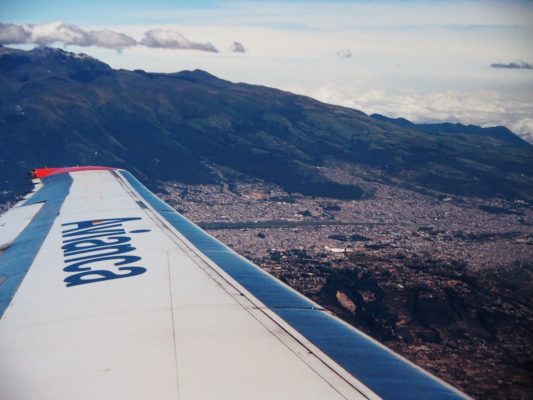
Within this family we can still examine some subdivision through Whatsapp groups. Tim said there is one group only for his mother/father and sister, one for the direct family including mother, sister, uncle, and cousins of first degree, one with all cousins of every degree and one for the whole family cousins, uncles, aunts all degrees.(IT) So in contrast to their German families, in Ecuador their family does not stop after the first degree. This can be quite confusing, so confusing that sometimes at birthday parties Tim and his cousin Cristian were unsure if a guest was just a friend or indeed a cousin.
Different to his sister Sophie Tim also spent one year living in Ecuador when he was 15. In 2009 he had personal problems in life and his mother Sol wanted to give him some distance to Germany. His aunt Patricia welcomed him with open arms in her house, her eldest son just had died to a chronic disease and Tims arrival was balm for her soul. In Ecuador he went to high school, organized by his aunt who worked in the school, and Tim remembers that his mother wanted that he gets to know the
country and his family in a different way than when he visits in vacation.(IT) This year spent in Ecuador might explain why he identifies “more” Ecuadorian than his sister Sophie. We also can examine that a migration “back” is also made easier through family. While Sol, Samuel and Erika had help from their family in Germany with their arrival in Germany, now Tim, Sophie and Nina could rely on their family in Ecuador if they wish to live in Ecuador.
The responses to the question “Could you imagine to live in Ecuador?” correlated with the cultural identities of Tim, Sophie and Nina. Tim (identifying as German-Ecuadorian) definitely can imagine to live in Ecuador, Sophie (identifying as German and Ecuadorian, but more German) was not as sure but a slight possibility exists, Nina (identifying as German) on the other hand can not imagine to live in Ecuador.(IN, ISo, IT)
Summarizing we can say that with the more time spent in Ecuador the Ecuadorian identity is stronger.
Language
Being able to speak Spanish was an important asset to flourish an Ecuadorian identity. Spanish enabled Tim, Sophie and Nina to communicate with their family in Ecuador, to take part and understand Latinamerican culture (books, movies, music). Again here we have a correlation between the fluency in Spanish and the expression of Ecuadorian identity. Tim speaks completely fluent, Sophie is proficient in speaking Spanish and Nina understands everything but rarely speaks and does not like to speak in Spanish. This goes even so far that Nina is more comfortable to speak English with her cousin Erika (who does not speak German) than to speak in Spanish.
The Ecuadorian parent was key to teach Spanish. Tim remembers that his mother Sol only spoke to him and his sister in Spanish.
Different to Tim and Sophie, Nina was not forced to speak Spanish with her father, she said that when he spoke in Spanish with her
In addition to grow up bilingually, Tim, Sophie and Nina were sent to a Spanish course once a week for maternal speakers. None of them liked to go there, Sophie said that “after school you do not want to go to another school, you want to go to play somewhere…we always fought with our mother […]. We were never motivated for classes”(ISo) and her brother also stated that he hated to go there, but in retrospective he is happy that he went to the Spanish course and can write properly. Nina in contrast had it easier with her father Antonio and one day just refused to go to the Spanish classes, and in consequence of his less authoritarian temperament he did not force his daughter.(IN) Stephanie also tried to embrace her children to go to the course, she always had a lunchbox with sweets prepared “so [the children] at least would think ‘I have no desire to go to the lesson, but on the break there I will have a box full of sweets, that is nice’.”(ISt)
The different bilingual upbringing (and that Tim lived one year in Ecuador) explains why Tim speaks best Spanish, then Sophie and then Nina.
Spanish was mainly spoken with the family and therefore the language has a strong connection to family. One example that highlights this is Nina’s use of the word “primo”, which means cousins in Spanish. She remembers that when was referring to her cousin she “always talked about the ,,primos”, […] that [she] never used the German word [cousin]”(IN) for Tim and Sophie. She even said that she did not even know that the German word for cousin and ,,primo” were the same. It is also an example of a Spanish word that she started to use in her day to day German language. Sophie has a “reverse” story where she started to mix German words with Spanish. She always thought that “anmeldear” is a real world, while in fact it is a mix of Spanish grammar with the German word “anmelden” (eng. Register). She said that “I took it from my mother, who just someday invented German-Spanish words.”(ISo)
Even if small example we see how languages start to mix and to include words of other languages. And again with more engagement in Spanish, with more identificationmoments, Tim is the most profound speaker of his mother tongue within the three cousins and also has the most pronounced cultural identity.
A football match
In May 2017 the Ecuadorian football team had a friendly match with the Dutch team. The game was held in Amsterdam, only a three hour drive from Cologne. Samuel took this chance and organized a trip with all his cousins in Cologne to watch the match. We could suspect that Tim was the most enthusiastic to attend the game, at least more excited than Nina or Sophie. That was not the case, Tim remembers “the result was not so important [to me]. […] In this moment I felt like a German-Ecuadorian, like always.”(IT) Surprisingly for Nina and Sophie this Game was strong identificationmoment. For Nina it was a moment where she “had the feeling, yes that is my country, that is my team for that I can cheer now.”(IN) Sophie recalls that there she could “dive more into the Ecuadorian identity.”(ISo) Why was this event a more remarkable identificationmoment for Nina and Sophie than for Tim?
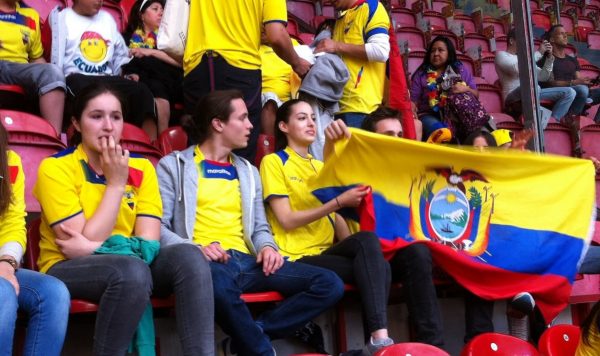
I think it has to do with the scares Ecuadorian identificationmoments they can encounter in Germany. To be reminded that you are Ecuadorian is not something that happens often, there are not Ecuadorian flags hanging at every corner. Sophie said that during the match she “really had the thought, yes right I am Ecuadorian too! Because I live in Germany and mainly speak German.”(ISo) An example for the rarity of moments where Sophie could identify as Ecuadorian is her former e-mail. In her teen years she had an e-mail called “sglatinagirl@…”, Sg for Sophie Graf and latinagirl because she felt like an Ecuadorian girl. The idea to choose this name came to her mind when she spotted another girls e-mail. Sophie recognized in the girl’s e-mail that the girl also has South American roots and thought that it was cool.(ISo) That was an infrequent reminder for Sophie that made her feel Ecuadorian, one e-mail address that made her identify with another girl because they had something in common.
To be present during the football game was again for Sophie and Nina a reminder to feel Ecuadorian. They were surrounded by hundred Ecuadorians who wore the Ecuadorian jersey, who came for the Ecuadorian Team, who rooted for their people, suddenly they felt as Ecuadorians among many other Ecuadorians. It was quite easy for Nina and Sophie to decide what team they cheer for. Something they usually did not have in Germany. In contrast to them Tim also walks a lot in Latin American circles in Cologne. He goes mainly to Latin parties in his words “because there my language is spoken, I met people there, who have similar interests, who grew up in the same or in a similar culture as I did”(IT) Tim did not “need” the reminder of a football match, and also he associated football with his German identity because his interest for football came with his German father. Opposite to my feelings when Germany and Ecuador had a football match and I did not know who to root for, he “definitely identifie[d] more with the German football team.”(IT)
This story also shows that the people decide for themselves what is part of their cultural identity. For Nina and Sophie this event is a nice memory of their “Ecuadorianness”, for Tim not so much.
Conclusion
Like in “Coming” family is an integral part of the migration experiences in shape of cultural identity. The difference between Tim, Sophie and Nina can be explained with the different amount of identificationmoments they had throughout their life. Tim spent most time in Ecuador, lived in Ecuador with his family and keeps a strong connection to his Ecuadorian side here in Germany. In contrast Nina has only been in Ecuador few times and apart from her family does not have a lot of Latin American people around her. Sophie is something in between her brother and her cousin. It must be stated that cultural identity is flexible and changing therefore it is possible that each identification changes. Maybe Nina feels “more” Ecuadorian after a visit in Ecuador, maybe Sophie less after a time spent in Ecuador.
Family was a driving factor behind the development of an Ecuadorian identity, especially through the mother.
The End?
Until now we touched two aspects of the process migration. In both family was a central theme.
The first involves the experiences of the people who decided to come to Germany. As it showed the initial decision was not instantly the decision to live in Germany “forever”, but sometimes it was surprisingly taken because one won a scholarship. After Antonio the process of migration was always connected with the established family in Germany.
The second part are the cultural identities of the children of immigrants. They often feel that a label like “German” or “Ecuadorian” does not fit for them, and so they create new identities like “German-Ecuadorian” or “German and Ecuadorian” depending on their contact with the Ecuadorian family.
I hope that with these two sections I could show that “Experiences of migration are deeply linked to family” and what migration as process can entail. A first decision to come to Germany in the 80s still is affecting events in 2020. Even this paper can be seen as part of the process. The two parts shown, that can stand independently for themselves, are just a small extract of this process. There are way more facets than we touched here. We did not touch exactly touch the creation of diaspora communities (even if family can be seen as the smallest piece of it), we have not focused on how immigration can change the everyday language of a whole society, we have not looked at economic ties that are formed in consequences of migration and there are many more parts that were not mentioned.
But too often the focus on migration is driven by the majority of society in countries like Germany. Questions like: How does migration benefit the economy?, or: Can the immigrants “integrate”? are on the agenda. With these questions it is easy to forget that it is often talked about immigrants and their children, but not listened to. A famous quote of the Swiss author Max Frisch says “We called for workers, but people came.” And people have families. Migration as I depict it is a personal process for many people, and in a country like Germany where roughly a quarter of the population have some sort of migration experiences, these experiences have to be listened to to understand today’s Germany.
Literature
- Instituto Nacional de Estadística y Censos: Reporte de pobreza y desigualdad, Quito 2018, URL: https://www.ecuadorencifras.gob.ec/documentos/web-inec/POBREZA/2018/Junio-2018/Informe_pobreza_y_desigualdad-junio_2018.pdf 1.
-
Fearon, D. James: What is identity (as we now use the word)?, Stanford 1999, 2.
-
Benhabib, Seyla: Kulturelle Vielfalt und demokratische Gleichheit. Politische Partizipation im Zeitalter der Globalisierung, Frankfurt am Main 1999, 49.
-
Stuart Hall cited in: Fearon, D. James: What is identity (as we now use the word)?, Stanford 1999, 5.
-
Hall, Stuart: Das Lokale und das Globale, in: id: Rassismus und kulturelle Identität. Ausgewählte Schriften 2, Hamburg 2000, 36.
-
Hall, Stuart: The spectacle of the ‘other’, in: id: Representation, Cultural Representations and Signifying Practices, London 1997, 234-235.
-
Hall, Stuart: Das Lokale und das Globale, in: id: Rassismus und kulturelle Identität. Ausgewählte Schriften 2, Hamburg 2000, 41.
-
Procter, James: Stuart Hall, London 2004, 124.
-
Krüger, Helga: Dominanz im Geschlechterverhältnis, in: Becker-Schmidt, Regina [ed.]: Das Geschlechterverhältnis als Gegenstand der Sozialwissenschaften, Frankfurt am Main 1995, 202.
- 08.2020 ↩




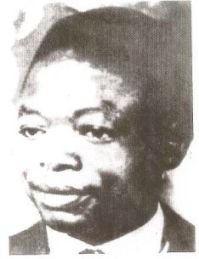
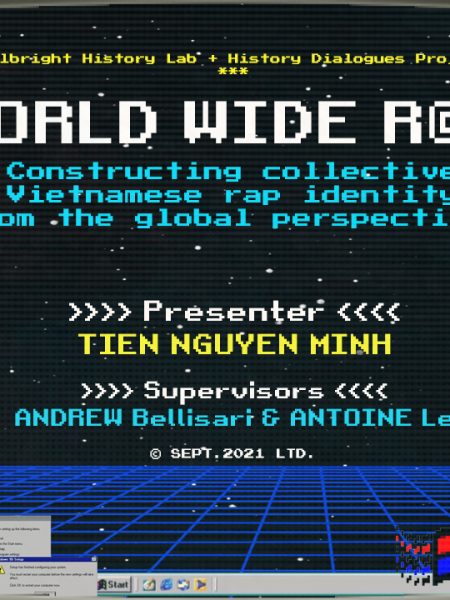

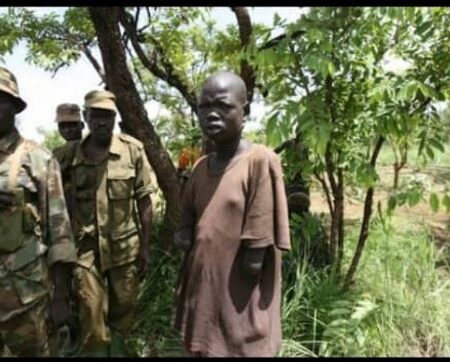
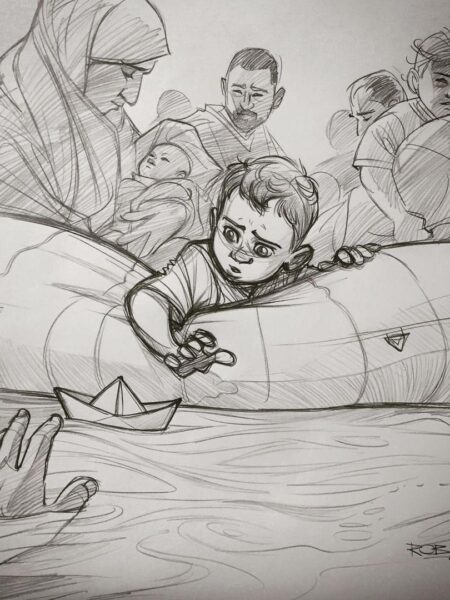
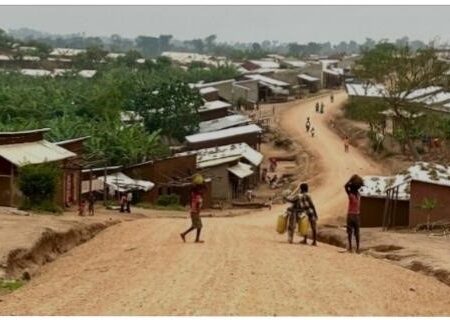
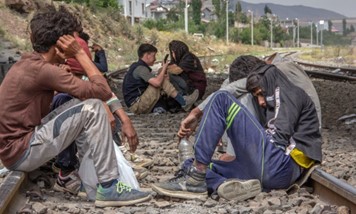
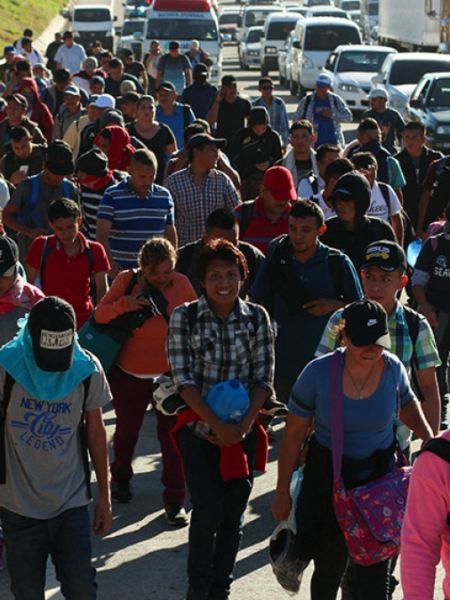
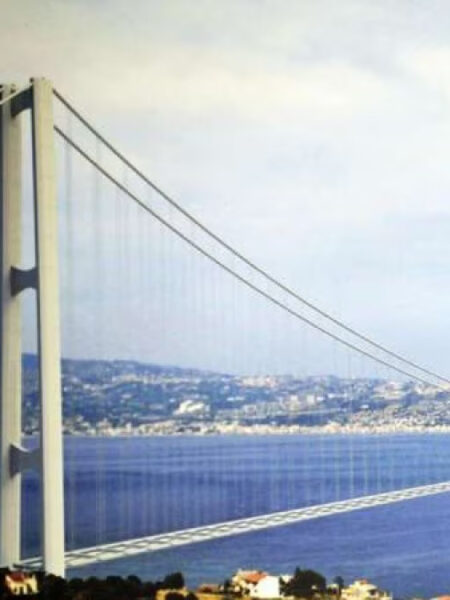

Dear Lukas,
Really wonderful project! Your material and analysis is incredibly rich and reveals fascinating insights into the experiences of migration. It really harvests the potential of oral history and particularly the value one can add by approaching a global phenomenon such as migration through the lens of individual life histories. – I wonder, have your interviewees gotten the chance to read your writing? Do they recognize themselves in it?
Dear Johanna,
after a month a couple of my family members have read the project and they recognize themselves in it. Furthermore some people with similar family history read the project and it resonated with their histories.
I found this piece a good illustration of how family and oral history can give a micro-level perspective that can bring together a number of broader themes. I appreciated the level of detail: the use of edited photos as a way of bridging distance was particularly evocative. The understanding of migration as an ongoing, multi-generational process, not a singular fact, is also a useful framing.
As someone who also migrated to Germany without ever really meaning to, I really liked the illustration that on an individual level migration, like many things that change the course of your life, can be almost a matter of chance – and find it a useful contrast to many studies of migrant motivation from the outside, with their tendency to try to understand migration as a rational choice.
Exactly! Especially after 40 years of migration history of my family, I see the process not only as one directional but as a back and forth between Germany and Ecuador.